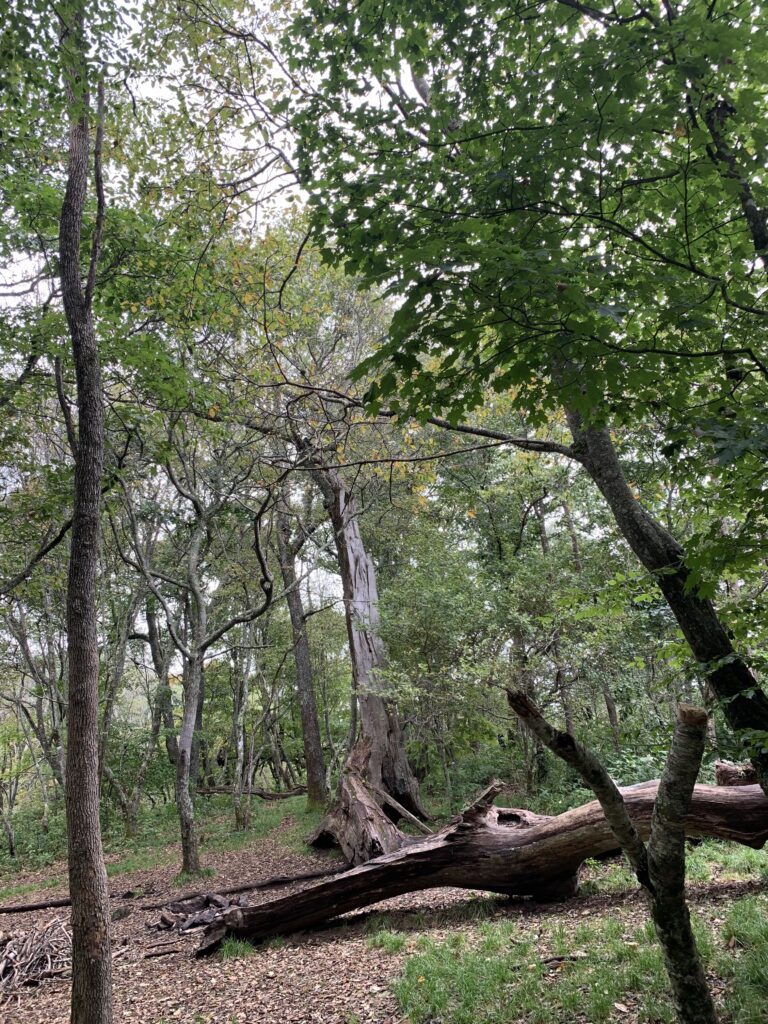Siham Muntasser
As mental health professionals discussing resilience, we can’t escape from a conversation about the painful aspects of life, which indeed have recently been many. Resilience, after all, is about acknowledging and overcoming hardship.
I ran into this tree in the mountains of the Pisgah Forest. It was a large tree that was perhaps hit by lighting. A big part of it had fallen down, but a smaller part of it was still alive, tall and growing with bright green leaves. The part on the ground was still oddly attached to the earth. The space which was once the canopy of the older tree was wide and empty. This majestic tree made me think of all the elders we have lost, and the void they have left. Part of them is still so very alive, and not just in the memories. I read the book, the Silent Life of Trees by Peter Wohlleben, then Finding the Mother Tree, Discovering the Wisdom of the Forest by Suzanne Simard, and more recently and most fittingly The Overstory by Richard Powers, who won the Pulitzer Prize in 2019. These books made me realize that forest life is an amazing hub of enchanted resilience!
Beloved Buddhist teacher, Pema Chodron in Welcoming the Unwelcome, acknowledges that just talking about death makes us feel uncomfortable. Yet, to be able to bear the discomfort helps us come to terms with our own mortality, and with losing loved ones. How we live now is how we die, she says. If we are at peace now, we will be strong facing the future, whatever it may entail.
Pema Chodron says the stage in which something hasn’t ended and the new has not yet begun, is the chance of a lifetime, full of opportunities for growth. This is the best metaphor for now, in between winter and spring. It is a phase of preparation, full of possibilities. Spring is the best time to start our gardens, and the garden is the original metaphor says Bahnson. Oliver Sacks also highlights the healing powers of gardens.As we start our new gardens, choosing the seeds we want to plant is very important. Thich Nhat Hahn in his book The Art of Living talks about the importance of “watering the wholesome seeds that lie in each of us and avoid watering the bad ones.” Buddhist psychology speaks of consciousness in terms of seeds, he says. There are many different types of seeds that lie inside us. Gratitude, kindness, and compassion are wholesome seeds, but we also have seeds like anger and jealousy that are a source of suffering for us and our loved ones. We have control on which ones we want to grow, just like in a garden.
This parallel between plant seeds and soul seeds is highlighted by St. Teresa of Avila when she talks about the Lord planting the seeds of faith in her heart. She details ways of watering her gardens. She describes moving from doing for God, to being with God, to simply resting with the Lord of the garden, from action to contemplation, from doing to being, bringing peace to the heart and soul. Vendana Shiva also talks about the importance of seed. Seed is the first link in the food system. Without seed there is no food, she affirms.
Any good garden needs to be fertilized. Composting is a fascinating and a deeply philosophical aspect of gardening. Thich Nhat Hahn talks about life and death as ephemeral aspects of each other. Composting is the perfect metaphor of the interface between life and death. Agriculture is about turning the earth. What dies gives origin to life. Life starts with death. Bacteria, worms, and fungi are mighty powerful. Just as the earthworm digests and then releases organic matter to create more fertile soil for future plants, we can compost metaphorically by examining our own prior experiences to allow us to extract lessons and truth, preparing a base for future experiences. In composting grief we turn waste into the good stuff for the lifecycle. Composting food waste is one of the most important things you can do to help save the world. Moreover, soil bacteria is good for our for mental health.

